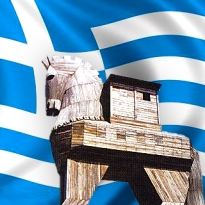 The CEO of Greece’s state-run horse betting monopoly has been released from jail after being arrested early last week. Alexandros Zaharis, head of the Hellenic Horse Racing Company (ODIE), was detained as part of the government’s get-tough program on tax scofflaws. The state claims ODIE owes them €83m in debts and another million in allegedly withheld taxes and dues. Greece has made over 4,000 such arrests in the private sector, but the Associated Press reported that Zaharis is the first official at a state-affiliated firm to be charged. Zaharis was released pending trial and given a month to settle his accounts. If convicted, he faces a minimum five-year stint in jail. Zaharis’ lawyer claims ODIE has since paid €200k of the withheld taxes.
The CEO of Greece’s state-run horse betting monopoly has been released from jail after being arrested early last week. Alexandros Zaharis, head of the Hellenic Horse Racing Company (ODIE), was detained as part of the government’s get-tough program on tax scofflaws. The state claims ODIE owes them €83m in debts and another million in allegedly withheld taxes and dues. Greece has made over 4,000 such arrests in the private sector, but the Associated Press reported that Zaharis is the first official at a state-affiliated firm to be charged. Zaharis was released pending trial and given a month to settle his accounts. If convicted, he faces a minimum five-year stint in jail. Zaharis’ lawyer claims ODIE has since paid €200k of the withheld taxes.
Like everything else in Greece, ODIE is slated for privatization, having announced last week that it would sell off its betting and real estate assets separately. Also scheduled to go on the block is the state’s 34% stake in betting group OPAP, although the process of bringing that pig to market seems to be taking almost as long as it took Axl Rose to record Chinese Democracy. Nevertheless, the chairman of Greece’s privatization agency maintains the tender will happen in Q1. Ioannis Koukiadis told Reuters that there were “a series of issues involved in the completion [of the sale] which are not time-bound. I want to believe we won’t have any problems as there is strong interest.”
Interest has reportedly been tepid in the country’s new online gambling licenses. A source told eGamingReview that just four operators have received interim licenses thus far: Goldbet.com, Championsbet.net, Casinostar777.com and one other unidentified operator. The deadline for applicants to submit their paperwork came and went this week, but many large operators chose to take a pass, put off by the requirement to fork over two years worth of back taxes. The Remote Gambling Association (RGA) is planning legal action challenging the new Greek gambling law, which it views as state aid. The RGA has already complained to the European Commission (as has the European Gaming and Betting Association), but this new RGA action will take place in a Greek court. The RGA will try to convince the Greek legislature to play ball before the Feb. 14 deadline.
If Greece’s demand for two years retroactive tax seems a bit desperate, it’s the prevailing mood. The debt-laden country could sell pretty much everything they own and turn the Parthenon into a McDonald’s, but it probably wouldn’t be enough to put their national finances in order. Greece defaulted on its foreign debt five times over the past two centuries, but this would be the first time with the euro as its currency. Nouriel Roubini, the New York University economist dubbed Dr. Doom for his unheeded warnings that the global economic crisis was looming, describes the eurozone as “a slow motion train wreck.” Speaking at the World Economic Forum in Davos, Roubini predicted 2012 would see the departure of Greece from the eurozone, with Portugal following the year after. Roubini puts the odds on a complete breakup of the eurozone in the next three to five years at 50%. If the future of the European financial system rides on a coin flip, Greek gambling laws will be the least of operators’ problems.